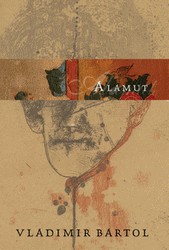UW librarian translates classic Slovenian novel
from University Week, Vol. 22, No. 8, Thursday, November 18, 2004 :
It’s a novel about the founder of a sect of assassins driven by an extreme interpretation of Islam. His fanatical followers, who have a cult-like attachment to their leader, are trained to become “live daggers” in a holy war, and are promised an afterlife in paradise as a reward for their martyrdom.

The location of this tale? Eleventh century Persia. And the novel itself, a fictionalized account of a real historical personage (sometimes called the world’s first political terrorist), was written in 1938 by Slovenian author Vladimir Bartol. Now, thanks to the work of a UW librarian, the novel, titled Alamut, is available in English for the first time.
Michael Biggins, Slavic and East European librarian and affiliate professor of Slavic languages and literatures, spent the last 18 months translating the nearly-forgotten novel that in the past 20 years has been recognized as a classic in Slovene literature….
Bartol’s work was written as Slovenia saw the rise of totalitarianism in three of its neighbors, Italy, Germany and Russia. “The novel,” Biggins says, “is sui generis, unlike anything else published in Slovenia up to that time. It is an exploration, in novel form, of the nature of totalitarianism, and the ways that political power can manipulate the public’s consciousness, and, he said, “resonates with 20th and 21st century experience in many ways.”
The main character is portrayed as sympathetic, a well-read man with great humor and intelligence. “The novel doesn’t supply any ready answers or snap refutations of totalitarianism,” Biggins says. “In fact, the trappings of totalitarianism are portrayed as quite appealing.”
Even after examining the novel at the microscopic level of a translator, Biggins still finds it “delightful. It is well crafted, and being that close to it was a pleasure.”
The publisher is Seattle’s Scala House. The publisher’s representative walked into Biggins’ office one day looking for the Slavic Studies librarian, to see if Biggins knew a suitable translator. Biggins, who has many book-length translations to his credit as well as numerous poems and short stories, jumped at the opportunity. I’d known about Alamut for at least 15 years. It had become a cult classic in Yugoslavia in the 1980s.”
Note: You can find out more about Alamut at the Scala House Press website: http://www.scalahousepress.com/titles/alamut.php.
Reviews
- Midwest Book Review
- First published sixty years ago, Alamut is a literary classic by Slovenian writer Vladimir Bartol, a deftly researched and presented historical novel about one of the world’s first political terrorists, 11th century Ismaili leader Hasan ibn Sabbah, whose machinations with drugs and carnal pleasures deceived his followers into believing that he would deliver them to a paradise in the afterlife, so that they would destroy themselves in suicide missions for him. Flawlessly translated into English (and also published in eighteen other languages), Alamut portrays even the most Machiavellian individuals as human – ruthless or murderous, but also subject to human virtues, vices, and tragedies. An afterword by Michael Biggins offering context on the author’s life, the juxtaposition of his writing to the rise of dictatorial conquest that would erupt into World War II, and the medly of reactions to its publication, both in the author’s native Slovenia and worldwide, round out this superb masterpiece. An absolute must-have for East European literature shelves, and quite simply a thoroughly compelling novel cover to cover.
- The Seattle Times
- This novel is loosely based on the life of 11th-century Ismailite Hasan ibn Sabbah, whom some credit with masterminding the idea of suicide missions and whose very name, by some accounts, has given rise to the word “assassin.”
Before tackling this novel, Bartol engaged in a decade of research. He offers interesting insights into the origins of the Sunni-Shiite split in Islam, and “writing as he was during the ascension of totalitarianism in Europe” he also conveys broader meditations on the nature of fanaticism.
For all of its provocative ideas and sometimes eerily prescient incidents, “Alamut” is also successful simply as an entertaining yarn.
Bartol devises a shifting collage of passions, adventure and sacrifice. The book’s exotic settings are sumptuously described, and the characters are charismatic and complex — despite the fervent aims of some of them to subscribe to single-minded devotion.
